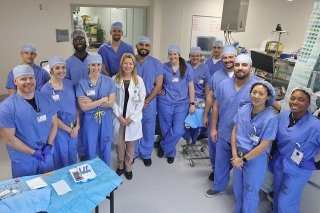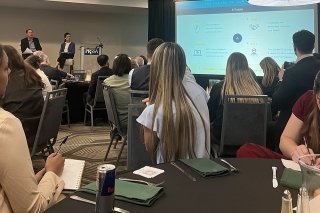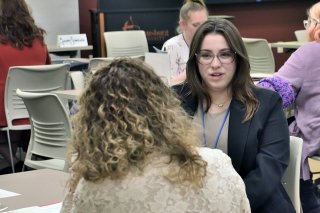Geisinger/Commonwealth Nurse Anesthesia Program Provides Vital Professionals
University-wide
Posted

The Geisinger/Commonwealth University Nurse Anesthesia Program is attracting attention from
students nationwide—and providing critical professionals for Pennsylvania.
The 36-month program, which results in graduates earning a Doctor of Nursing Practice degree, accepts just 15 students for each class. Those students come from as far away as California, Oregon, and Arizona.
A Certified Registered Nurse Anesthetist (CRNA) anesthetist provides pain medication care for patients before, during, and after surgery. They administer medications to keep patients asleep and pain-free during surgery and constantly monitor every biological function of the patient’s body. The specialization is in high demand across the country.
“We’re always in demand,” says program director Debra Minzola. “Starting salaries can be more than $180,000 with sign-on bonuses and money to relocate.”
Commonwealth University (CU) nurse anesthesia graduates have earned a compelling reputation in the industry
with the Class of 2022 earning a 100% pass rate in NCE National Certification Exam, while the average pass rate is 82%. Commonwealth U students also won first place in the Pennsylvania Association of
Nurse Anesthetists College Bowl last year in competition against all other programs in the state.
Headquartered at Geisinger Medical Center in Danville, the program’s facilities include advanced simulation equipment. When it’s time for clinical experiences, the partnership between Geisinger and CU enables students to have a broad array of experiences within Geisinger’s varied facilities.
After graduation, many students stay at Geisinger to practice as CRNAs. “Approximately 60% of our graduates are staying with the Geisinger System,” says Minzola. “That says a lot about the good relationship between the university and the clinical site. It makes it a more positive learning experience, and they want to stay here. Our recruitment has been phenomenal for Geisinger.”
Previously, the program led to a master’s degree. Omar Wijahat, who will graduate in May 2024 in the first cohort of graduates at the doctoral level, plans to stay in the region to practice in the Geisinger system. Like other students in the program, Wijahat came with experience—as a nurse technician for two years and an intensive care nurse for three years. “I got to know CRNAs dropping off patients and then was able to shadow them to learn about the field,” he says.
For Wijahat, a career in nursing is a way to carry on the nurturing tradition he experienced from his parents. “My mom and dad immigrated to the U.S. from Pakistan 25 years ago,” he says. “They gave me a lot with the little they had. In nursing, I can pay it back to other people. As a nurse anesthetist, you care for people when they are most vulnerable.”



